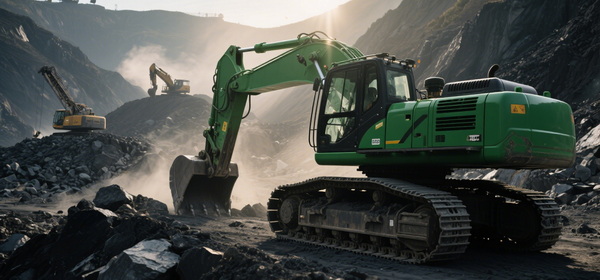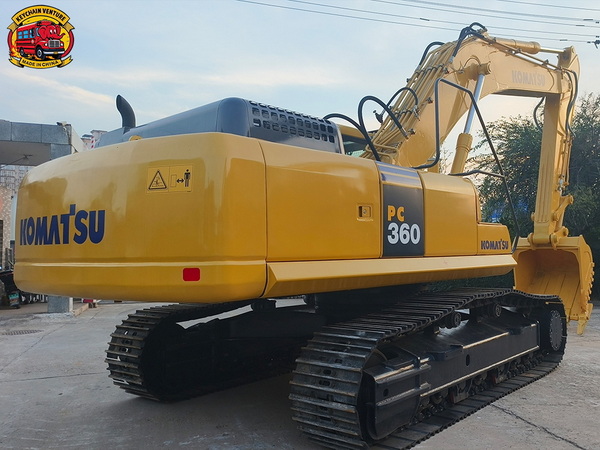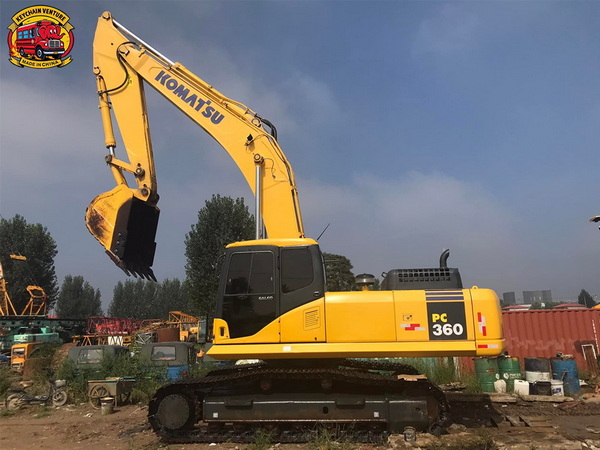Views: 222 Author: Amanda Publish Time: 2025-10-26 Origin: Site








Content Menu
● The Versatility of Mini Excavators
>> Expanding Urban Construction
>> Landscaping and Site Preparation
>> Infrastructure and Utility Installations
>> Agricultural Transformation
>> Small-Scale Demolition and Renovation
● Why Opt for a Used Excavator?
● Attachments and Accessories: Maximizing Functionality
>> Popular Attachments Include
● Environmental and Regulatory Considerations
● Technology and Safety Features
● Worksite Efficiency and Labor Optimization
>> Urban Renewal Project in Beijing
>> Farm Efficiency in Shandong Province
>> Export Success to Global Clients
● Trends in the Used Excavator Industry
● Best Practices for Longevity
● The Future of Mini Excavators and Used Equipment
● FAQ
>> 1. What specific tasks are best for mini excavators?
>> 2. Why is buying a used excavator recommended?
>> 3. What maintenance is essential for used excavators?
>> 4. Which attachments boost versatility?
>> 5. How do buyers ensure quality in a used excavator?
Mini excavators are dynamic, compact machines engineered for efficiency, versatility, and productivity across a broad spectrum of modern construction and industrial projects. Their unique design and flexible capabilities—especially when considering the advantages of a high-quality used excavator—enable professionals to tackle jobs in confined, complex, and challenging environments. As the demand for sustainable and cost-effective solutions grows, the market for used excavators continues to expand, offering smart alternatives for both domestic and international clients.

Mini excavators, typically defined by their operating weight (usually below 8.5 tons), have rapidly evolved into indispensable assets for builders, landscapers, farmers, and municipal crews. Their compact frames allow operators to perform precise work within tight spaces, enhancing productivity where larger machines can't reach.
In urban development and renewal, mini excavators solve critical challenges. Whether it's excavating for new foundations in densely packed neighborhoods, upgrading utility lines, or handling renovation tasks, these compact machines make minimal impact on surrounding areas while maintaining high efficiency. Choosing a used excavator for such work balances financial considerations with operational reliability.
Landscaping professionals utilize mini excavators for shaping terrain, digging irrigation channels, removing tree stumps, and grading surfaces. Their delicate control and variety of attachment options—such as hydraulic thumbs or augers—enable intricate work without damaging existing features. Used excavators are increasingly preferred for routine landscaping and seasonal site preparation, thanks to their affordability and proven performance.
Mini excavators are invaluable for laying pipes, burying cables, and constructing utility networks. Their precise digging capability limits disruption to roadways, gardens, and pavements, making them ideal for urban infrastructure projects. Used excavators, when properly maintained, deliver reliable results and help teams meet project deadlines on tight budgets.
Farmers harness the power of mini excavators for activities such as trenching, ditch cleaning, material handling, and installing fence posts. The compact size and maneuverability of these machines, including used excavators, streamline processes that once demanded significant manual labor and time.
For demolition of small structures, concrete pads, or interior renovations, a mini excavator's agility is unmatched. The market for used excavators in demolition is robust, as many models retain their hydraulic power and attachment compatibility well beyond initial use cycles.
The advantages of selecting a used excavator reflect both practical and strategic considerations:
- Economic Value: Used excavators are available at significantly lower initial costs, providing the same productivity as many new machines.
- Immediate Availability: Stocked by reputable suppliers, such as KeyChain Venture Co., Ltd., used excavators can be sourced quickly for urgent projects.
- Wide Selection: Buyers have access to numerous brands, models, and features based on prior usage and maintenance records.
- Lower Depreciation: Financial loss due to depreciation is notably reduced when purchasing used equipment.
- Sustainability: Extending equipment life helps reduce waste and supports global efforts toward resource conservation.
Potential buyers and operators should conduct thorough checks to ensure best value and performance:
- Examine the service and maintenance history; machines with regular servicing show greater reliability during extended work cycles.
- Check for any visible damage, rust, or hydraulic leaks, especially around pivot points and attachments.
- Test compatibility with essential attachments required for project scope (buckets, hammers, augers, grapples).
- Investigate the technical specifications—engine hours, fuel efficiency, and safety systems—to match job-site needs.
- Source equipment from trusted dealerships for warranties and after-sales support.

Mini excavators transform into multi-functional workhorses with the right attachments. This adaptability is critical to their widespread adoption.
- Grading Buckets: For smoothing surfaces during landscaping or site prep.
- Trenching Buckets: Essential for pipe and cable installation.
- Augers: For drilling post holes or minor piling tasks.
- Hydraulic Breakers: Used in demolition for breaking concrete, asphalt, and rock.
- Rippers: Aid in breaking hard ground or frozen soil for seasonal work.
Many used excavators maintain compatibility with modern attachments, ensuring legacy value and operational innovation.
Operating a mini excavator, especially an older used excavator, comes with a responsibility to meet local emissions standards. Suppliers such as KeyChain Venture Co., Ltd. assist customers with compliance by providing machines equipped or retrofitted to current regulations, further reducing the environmental footprint.
Contemporary used excavators often integrate technology or offer options for upgrades, including:
- GPS and Telematics: Monitoring machine performance and tracking usage.
- Advanced Hydraulics: Precision controls save fuel and enhance operator safety.
- Operator Comfort: Ergonomic cabs and intuitive consoles lower fatigue and improve job performance.
- Safety Systems: Features like overload sensors and stability alarms are increasingly standard, even in used models.
Mini excavators—including used units—help companies maximize labor resources and achieve consistent project outcomes:
- Reduced Labor Demands: A single operator can manage dig, transport, and grading tasks that would require multiple workers manually.
- Less Site Disturbance: Their smaller footprint means faster restoration and minimal disruption to pre-existing environments.
- Faster Project Completion: Immediate availability and rapid deployment improve timelines on jobs that demand speed and precision.
To modernize municipal infrastructure, crews deployed mini excavators sourced from used inventories to navigate narrow alleys and sensitive utility corridors. The machines facilitated rapid progress, reduced local disruption, and kept project costs manageable.
A local farmer used a mini excavator, purchased as a used unit, to install new irrigation lines in less than half the time required for manual labor. This improvement led to better crop yields and reduced operational costs over the season.
KeyChain Venture Co., Ltd. has expanded exports of used excavators to international buyers, offering tested, high-performance models tailored for construction, mining, and disaster relief. Their reputation for quality assurance and after-sales service drives repeat business and supports clients in diverse markets.
Increasingly, businesses are reinvesting in used excavators to balance efficiency and capital expenditure. The continuous upgrade of regulatory standards and the integration of tech solutions into older machines make used equipment more attractive than ever for emerging markets and small-scale operators.
Selecting a trusted dealership is critical when purchasing a used excavator. High-quality suppliers offer equipment inspection, transparent history, extended warranties, and technical support. This level of service helps buyers avoid costly repairs or compliance issues down the line.
Achieving maximum operational life from a used excavator requires:
- Strict adherence to maintenance intervals outlined by manufacturers.
- Regular oil and fluid checks
- Replacement of worn hydraulic lines and filters
- Keeping accurate operation logs for troubleshooting and future sale value.
With ongoing advancements in machinery and attachment design, the mini excavator market—including the used excavator sector—will continue to grow. More businesses are turning to sustainable purchasing models and advanced maintenance routines to optimize operations while reducing environmental impact.
Mini excavators remain central to modern construction, landscaping, agriculture, and infrastructure development. Their size, versatility, and adaptability—especially when sourced as a used excavator—make them the preferred choice for projects requiring precision and efficiency. By relying on reputable suppliers, thoughtful maintenance, and suitable attachments, professionals and businesses can maximize investment value and project outcomes. As technology evolves and markets broaden, the prominence of used excavators in the equipment fleet will only strengthen, supporting growth and sustainability worldwide.

Mini excavators, whether new or used, excel at trenching, grading, site prep, landscaping, and small-scale demolition, with remarkable performance in confined or sensitive environments.
A used excavator delivers financial savings, reliable productivity, and rapid availability, especially for budget-conscious projects and proactive business operations.
Routine inspections, scheduled servicing, and prompt replacement of parts ensure consistent performance and longevity in any used excavator.
Attachments like grading buckets, hydraulic hammers, augers, and grapples allow mini excavators to accomplish a wide range of tasks efficiently, supporting changing project needs.
Buyers should verify service records, inspect physical condition, and work with reputable dealers offering guarantees and after-sales support for best outcomes.